|
It’s a short, brutal, bloody gutter punk Macbeth. The stage is brick, board and graffiti punctuated by caution tape. Life is short for filth in the absence of wealth. Director Alec Lachman has sliced Shakespeare’s classic tragedy to a very lean, percussive aggression. You’re in at 7:30 and you’re out by 9:13. Let the royalty of big funding handle longer, more elaborate productions. Let the bigger UPAF-borne theater companies handle the fancy decoration of a complete Shakespeare script. Down here on the street life is shorter and more aggressive. Tables get smacked in half by broadswords. People spit blood into the shadows of the basement. Macbeth is ambition and ambition is ugly. Let it look ugly. But not like the ambitious awful orange ovoid in the oval office. This is a street-level ambition and it needs to look as tough as it is. The first time we see the powerful figure of the king-to-be, he’s carrying a wooden riot shield. Michael Cienfuegos-Baca is playing Macbeth. He's big and wearily aggressive. Physically imposing. He also designed the set. He uneasily rules an alley he made. The actor/designer works for a bank by daylight but here he IS power. His time is short...spurred-on by the prophecy of three witches. (The witches are the one part of the production I didn’t love. They have their moments, but they’re a bit over-the-top. They always are. Never saw a production where they weren’t. Just once I’d like to see them played every bit as cold and emotionless as fate itself. Following tradition, Director Alec Lachman guides the witches into cackling madness. It’s okay. It fits the mood of the piece quite well.) Hannah Kubiak’s costume design has armor that suggests repurposed road signs. Spears are flagged with tattered yellow caution tape. Thee’s an old gas mask hanging from one of the walls. Smears of makeup seem to cover everything like stylized stains. There’s synth scoring by The Twilight resonating through a decaying alley. The cast drinks from empty tin cans. Receded from its traditional visual trappings, we get an angry clawing of raw ambition. There’s no visual fanciness of wealth onstage, so there’s no royalty-by-blood on the surface in this production. It’s all aggression and physical power. In this atmosphere Alexis Furseth is a badass Lady M. We get the feeling that Lady Macbeth could and would rule the disheveled corner of brick and graffiti all by herself but for the fact that she’s not physically big enough to beat back the competition. Her anger and frustration at Macbeth’s anxious weakness explodes at times. Just before telling him where he can stick his courage, she SLAPS him. She’s not going to take weakness from anyone, let alone her own husband. (She’s so boss...) That slap is not alone. Lachman’s cut of the script has plenty of percussion. There’s more time for scrambling, scratching villainy than stern-eyed heroism, but thankfully there’s also humor. Sarah Zapiain is my favorite witch in the cast, but she’s also an excellent drunken porter. Zapiain is fun to watch around the corners of the production...always making interesting, little moody movements that add to moments on the edges of the ensemble. She makes a fun appearance as the porter after some murder. She awakens drunken--half-in and half-out of fluffy handcuffs with plenty of mood and attitude that’s perfectly at home with the rest of the show. The whole thing is animated by a restless homeless madness. The physical trappings of the show make it feel real, but it could also be an extended psychotic fugue for those who have fallen on hard times into some back alley somewhere. That’s really what this kind of ambition is at its heart in the “real world,” though . . . it is an exhibition of ugly, disheveled gutter scratches. Out there beyond the stage in the “real world,” ambition may look decadent, corpulent and Trump-like on the surface, but Lachman and company find the true face of ambition here and it’s not pretty. Out here on the street in the corner alley in the basement it’s all very brief. Down here with all the trash and detritus and wire mesh fencing next to a derelict stop sign it's all very close. Down here in this subterranean production of Macbeth it’s all close enough to feel the respiration and dizzy energy sweat and heat. Down here talent sweats away at night in late night rehearsals before surfacing into the daylight of day jobs. At night beneath the street downtown, though...this is where it’s real. Kyle Conner plays Malcolm who takes the throne as the lights fall before the final bows. Conner as Malcolm on his throne make for a powerfully uneasy ending image for the production. He’s won, but there’s no look of triumph on his face. There’s only fear in his eyes. All too quickly it ends but we know...we know it’s never over. Voices Found Repertory’s production of Macbeth runs through Mar. 31 at The Arcade Theatre in the Underground Collaborative on on 161 W. Wisconsin Ave. For ticket reservations and more, visit Voices Found Online.
0 Comments
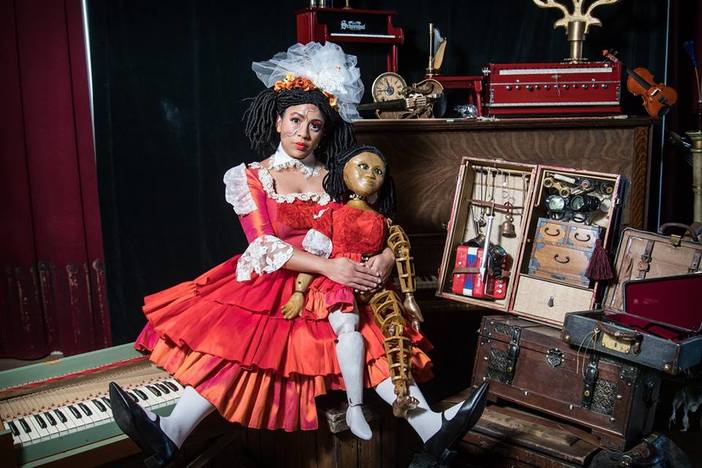 Cecilia Davis (Olympia) in rehearsal for Skylight Music Theatre’s production of The Tales of Hoffmann, March 16-29 on the Cabot Theatre stage. PHOTO: MARK FROHNA Cecilia Davis (Olympia) in rehearsal for Skylight Music Theatre’s production of The Tales of Hoffmann, March 16-29 on the Cabot Theatre stage. PHOTO: MARK FROHNA Tales of Hoffmann has a casually epic feel about it. It was the last work of the great composer Jacques Offenbach. (He died a year before it debuted.) It wasn't what one might expect as a final exit for a great artist, though. It wasn’t a big, sweeping magical end of life journey. The story might be seen as a perfectly ordinary evening between a man and his muse as he relates the story of three lost loves. All the same, there's magical emotional weight to it. This month The Milwaukee Opera Theatre and The Skylight invite audiences to a magical evening at the Broadway Theatre Center as they present a production of Hoffman’s three tales. John Kaneklides is suitably passionate as Hoffmann—a man lost to his loves who must be coaxed into reliving them by his muse—a compassionate host played by the golden-voiced Diane Lane. From a stylishly-detailed set, Hoffmann scratches away searching for some kind of insight until his muse finally conjures a trio of stories out of him. Olympia The first love gracefully cascades into a steampunk mood. Hoffmann falls in love with a clockwork girl named Olympia. She’s played by Cecilia Davis with clever shades of automation breaking through the beauty of creation. There’s a subtle horror of it that Davis delivers brilliantly...sort of a clockwork operatic rendering of the uncanny valley effect that’s great fun between the ticktock woman and the doll she holds. Nathan Wesselowski plays the inventor who designed her. Wesselowski plays the role with deft slices of style from a characteristically sharp sense of humor. Ariana Douglas is clever as the conniving rival inventor who threatens to bring an end to it all. 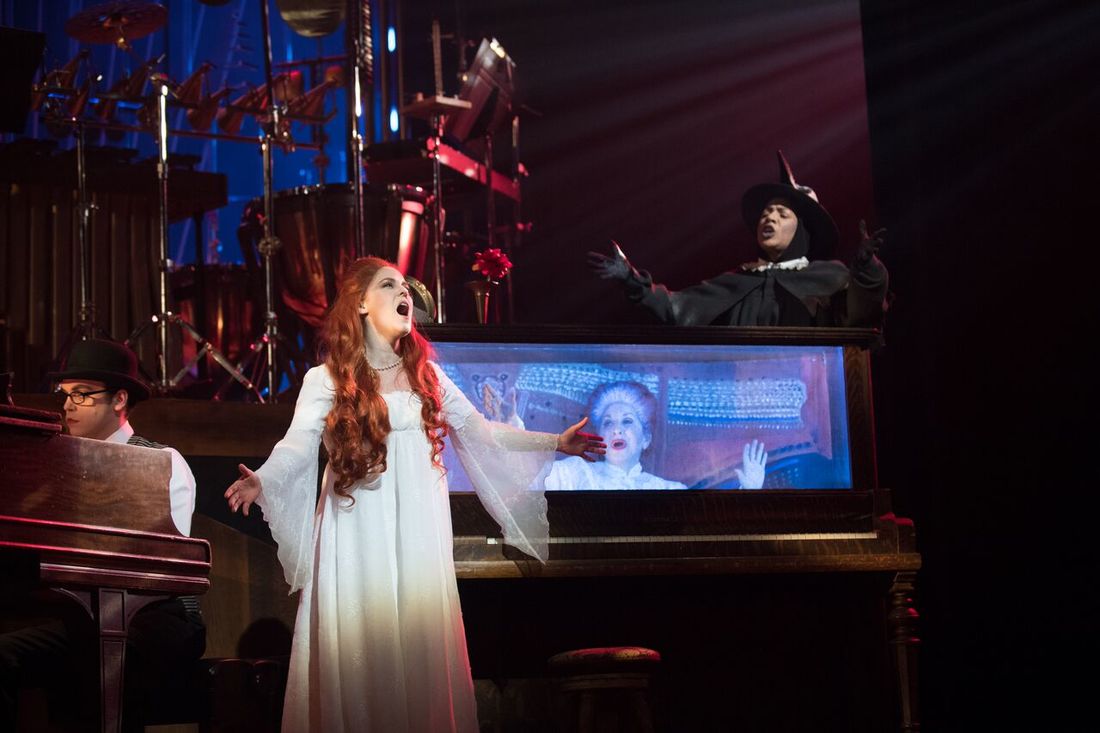 Josh Robinson (assistant music director), Susan Wiedmeyer (Antonia), Carol Greif (a ghost) and Cecilia Davis (Dr. Miracle) in rehearsal for Skylight Music Theatre’s production of The Tales of Hoffmann in association with Milwaukee Opera Theatre, March 16-29 on the Cabot Theatre stage. PHOTO: MARK FROHNA Antonia With one tale ending poorly, Hoffman is allowed the first of two intermissions before launching into his second story. The clockwork mood of the first story vanishes in favor of a more haunting ghostly feel as the writer speaks of his love for Antonia. Susan Wiedmeyer is longingly spectral as the love interest...she’s in slightly ill-health which threatens to get worse, but she loves to sing, but her father has forbidden it. Edward Lupella summons a very touching paternal concern for Antonia. He’s a violin maker whose wife has died. All singing reminds him of her. There’s a tenuous balance to things that tumbled apart at the touch of the sinister Doctor Miracle, played with delicious menace by Cecilia Davis. Each Of the three stories has it’s one incredible moment of intensity. In this tale, it is divided between a daughter and the ghost of her late mother. There is real magic and how they’re putting it on the stage. The very real image of her mother appears on A piano as the doctor looks on. Mother and daughter saying in that hazy space between death and life. Giulietta Ariana Douglas plays with grace as Hoffmann’s final love of the night. She appears after the second intermission to woo Hoffmann at the request of a sorcerer played by Wiedmeyer. Sonya Berlovitz has the costume designer’s dream of working on this show. There are some really beautiful pieces in this production. By far my favorite has to be that of the sorcerer Dapertutto. Asymmetrical top hat. Eyepatch. The look of us stage magician crossing over into vaguely hypnotic kind of black magic. Very cool stuff. And why does this sorcerer want Hoffmann to be seduced? If Giulietta can enchant Hoffmann, she can capture his reflection for her. In exchange Giulietta gets a shiny valuable. That’s got to be one of the most poetically badass things to steal from someone: their reflection. Any villain can demand someone's soul. It takes a very special kind of sinister to demand someone's reflection. The theme of reflection echoes into the costuming. All the attendees at the little get-together are wearing mirrored domino masks. It's a cleverly stylish amplification of the theme of identity loss in pursuit of passion. Yes: It's Opera...but on the Other Hand...It's Opera (!) Opera can be dauntingly long. The prospect of being in a theater for a 2 1/2 hours can give any potential audience pause. What with so much emotion coming out in over such a protracted period of time it can feel over-rendered. Milwaukee Opera Theatre does a really good job of striking a balance between casual approachability and the popular stereotype of opera as over-the-top high art drama. For all practical purposes, Tales of Hoffman is simply the story of a writer coming up with an idea for a new piece. It doesn’t need to be anything more intense than that. However, that act of creation has its own intensity. That casual creation lies the heart of all art which is the center of all existence itsef. So at the same time as it is just a casual talk with them use over a few drinks with someone who is sensitive enough to be quite dramatic about it it’s also reaching into the very soul of life. Stage Director Jill Anna Ponasik understands the balance between the casual and the fantastic and delivers that balance to the stage quite well once again. Milwaukee Opera Theatre and Skylight Opera Theatre’s production of Tales of Hoffman runs through Mar. 29 at the Cabot Theater in the Broadway Theatre Center. For ticket reservations and more, visit Milwaukee Opera Theatre online. Playwright Deanna Strasse’s Dancing With Hamlet has a very raw and organic emotional connection about it. The family drama makes its world premiere this month in one of the coziest spaces in town: the early 20th century domestic warmth of the Brumder Mansion Bed & Breakfast. A space that once housed a family now serves as home to a family of characters who are dealing with a funeral and a wedding. Dancing With Hamlet is a contemporary middle-class American sort of thing. A husband and father have died and his divorced wife is getting remarried. Wedding plans have been made and they will go through regardless of the death of the bride’s ex-husband. The three adult children of the wife and her late ex-husband are a bit upset about the whole situation. There’s a powerful simplicity about the contrast between wedding and mourning that Strasse does a respectable job of rendering. The three adult kids play like the three parts of the Freudian model of the human psyche: Melody Lopack plays Elvira Flack. She’s the Ego of the play. We see everything more or less through her eyes. She’s a professor of English and she’s learning to cope with the death of her father. Naturally the juxtaposition between death and marriage is going to remind her of Hamlet. The play is punctuated in her mind onstage by bits from Hamlet, but to her credit, Strasse doesn’t try to gouge Shakespeare’s tragedy too far into the heart of the contemporary family drama. Lopack is irresistibly fun in the role on an intellectual level. Lopack says as much in silence as she does in dialogue. In any given moment there are about a half a dozen things that Elvira could be saying. She chooses one of them and the dialogue continues. Lopack surrenders herself so completely to the role that we see Elvira drift between possible responses in silence as thoughts glide across her face. Cory Jefferson Hagen plays Beau Flack. Of the three siblings, he’s the most grounded and totally together so naturally...he’s the Superego of the play. He’s stable. He has a solidly grounded and realistic perspective on things. And he drinks liquor...just like a real Superego. Being the calm voice of reason in the room would run the risk of coming across as being profoundly dull were it not for the fact that Hagen’s playing the role. He has this almost comically level-headed poise about himself that’s a lot of fun to watch in the role. Josh Scheibe plays Wilde Flack. He’s the Id. He wants to deal directly with the emotions at the heart of everything that everyone else seems so intent on diverting or pivoting away from in some way. He wants to feel the pain of the loss and really embrace it, but he may love the loss more than he loves the father he lost. So it’s complicated. And so is he. They say he’s named after Oscar Wilde. So he’s got just as much of a sense of the dramatic as Elvira does...only he acts on it. Scheibe cleverly keeps Wilde’s wild in check. The character’s temperament is erratic and emotional, but he’s very methodical in his approach to it all. Scheibe does a really impressive job of delivering the cold calculations of the character without compromising his passions. Donna Daniels plays matriarch Rosie Flack. She’s excited about her marriage. She’s quite happy. And her longtime husband has just died. Daniels plays the in-your-face mystery about the character with a theatrically casual demeanor. Does she really think she’s starting her life with a man at this stage in her history? Is the wedding about her or is it about her AND her intended husband? Why does she seem to have no response at all to the death of her ex-husband? Clearly she has issues going into this marriage. It is to her great credit that Daniels doesn’t over-render those issues because the center of her personality really rests in her ability to ignore it all and just have a good time. Daniels delivers that beautifully. And then there are the two who AREN’T related to anyone else by blood... Emmitt Morgans is delightfully awkward as a cancer research scientist Dr. Tony Simms. A bit of a socially flaccid individual, Simms seems to have followed Rosie around long enough to have stumbled into a wedding where he he just happens to be the groom marrying her. Morgans plays it just a few shades shy of outright silliness, allowing the character just enough emotional center to feel heartbreakingly real throughout the play. There are people like this. There are people who feel like cartoon characters in real life. It can be monumentally difficult to bring that kind of thing to the stage and make it still feel like real life. Strasse and Morgans have done an informally brilliant job of this. Amanda J. Hull plays the girl next door. Literally. She’s Jean: a receptionist who could have been a hair stylist who just happens to live next door to the family with her mother. She grew-up right next to the three siblings and right along with them. As she’s playing a bit of an outsider, she’s not given a whole lot of depth to explore. The comedy of the character may come in the fact that...even though it’s not her home, she’s actually the only one playing the part of the hostess trying to smooth things over and make them pleasantly sociable throughout the play. Thankfully, Hull plays half of the single most memorable scene in the entire play. There’s a conversation between her and another. Hull does a clever job of slowly backing into a moment between Jean and one other character and it really IS a heartbreakingly sweet moment that has so tragically little to do with the rest of the play. To say more would be to ruin the moment, which I may well have done simply by bringing it up. With this and so much else, director Carol Zippel has found just the right balance. Beyond the Freudian family drama there’s real allegory that could be read into the plot as any well-rounded family tends to echo the society that it’s a part of. On one level, Dancing With Hamlet can come across as being profoundly political. Maybe we’re all Melody Lopac carrying around our father’s ashes just trying to make sense of it all in such a strange and strangely familiar world that isn’t quite what we want it to be. Windfall Theatre’s production of Dancing With Hamlet runs Mar. 15-24 at the Brumder Mansion on 3046 W. Wisconsin Ave. For ticket reservations, call 414-332-3963. Drive around in the vicinity of Madison and you’ll see the name on road signs. Verona, Wisconsin. (A city of 10,000 outside of Madison.) The name of that town always seemed to suggest an interesting location for a Wisconsin-based adaptation of the romantic Shakespeare drama that is famously set in Verona, Italy. The obvious joke makes it to the stage courtesy of writer/funny guy Michael Christopher and Emerald Condor Productions as it stages a fun, little light comedy at the Alchemist Theatre this month. Originally developed for Madison’s Broom Street Theater, the comedy in question is Dick Pix Montana--a spoof of Romeo and Juliet set in contemporary Verona...Wisconsin. Two Young Lovers Separated by Text Bryson Langer and Katie Katschke play a pair of young Millennials who fall in love in suburban Wisconsin. Michael Christopher puts the two high school kids through an extended courtroom drama spoof that ultimately results in...social suicide. The heaviness of the original story is made light in a breezy sketch comedy haze that also manages to cast a stern glance in the direction of the law as it pertains to sexting. (I honestly don’t know why I didn’t see that coming given the name of the comedy. The program lists an anonymous “Legal and Procedural Consultant.” For light sketch-like comedy, this show makes a surprisingly sober point about current laws.) The Humor of ...y'know...the Casual Bryson Langer is enjoyably affable as the Nice Guy Romeo--a guy named Richard Montana. His penchant for getting interceptions on the football field has earned him the name “Picks.” (So...y’know...Dick “Picks.”) Anyway...Katie Katschke has a nicely appropriate deadpan delivery even for the weakest humor. I love that they’re really casual about the romance. Langer and Katschke have a really nice nonchalance as high school characters who have taken a liking to each other. In a culture raised on social media, everything’s cool. No big deal. It’s just love, y’know? There are Other People Too There are some great appearances in and around the edges. Writer Michael Christopher shows-up as the prosecuting attorney. He’s got sharp delivery and a sense of subtlety in places that go a bit beyond the level of standard sketch comedy. Also of note here are Michelle White as a local news anchor, J.J. Burch as the chronically distracted judge and J.J. Gatesman (yes: a TWO J.J. production) as Richard’s good friend Ben Volio. The Dragging of the Comedy Shaving the original story into 70 minutes (give or take) and turning it into a courtroom drama keeps the whole thing feeling quite breezy. Some of the comic rhythm is thrown-off a bit as the script features A LOT of scene changes. There are twenty scenes listed in the program. That’s a lot of, “fade to black, move things around, lights rise...and action,” to throw into anything less than 90 minutes and it can feel like it’s dragging in places. The Comedy of the Comedy The comedy in Christopher’s script comes primarily from three different places: Shakespeare, Millennial culture and the sweaty basement of sketch comedy. ...I'm Just Saying... The standard sketch milieu is apparent from the beginning. All other elements aside this IS a courtroom comedy in which a Romeo-like character is standing trial for accidentally posting a sexually explicit picture (intended for Julia) on Instagram. So there are going to be dick jokes and such. Personally I would have liked to see the lowbrow stuff fade into the background in favor of a more determined focus on satire specific to South Central Wisconsin, but there’s some of that there as well. The Shakespeare Thing There are quite a few Shakespearian references here. Some of them work quite well. One cannot stage a comedy like this without making some reference to West Side Story...which is handled here by surmising a two-high school “Verona East” and “Verona West” rivalry with Sharks and Jets. Cute. The Jets wear the logo for the NFL team. Julia can be seen wearing a shark snuggie as she texts her Romeo. It’s cute. The Millennial Thing Then there’s the whole Millennial end of things. Romeo and Juliet suggests a traditionally tragic romance. Michael Christopher does a good job of comically juxtaposing traditional romance against the realities of contemporary young love. Parents can forbid kids from seeing each other, but in an era of social media, it’s really difficult to keep them away from each other. The two characters might have only seen each other in person a couple of times, but through social media they know each other a lot better than Shakespeare’s lovers did. It’s more of a casual romance. Those Emojis Key conversations in the course of the play take place over text messaging complete with emojis that pop-up on cards net to the actors. There’s a clever economy to the emoji cards. There’s a clever timing between the cards and the dialogue that amps-up the overall cuteness of the production as a whole. It might not always be as clever as it’s trying to be and not every joke is terribly funny, but there’s a cuteness at the heart of the production that holds it all together quite well. Emerald Condor Productions’ Dick Pix Montana runs through Mar. 17 at the Alchemist Theatre on 2569 S. Kinnickinnic Ave. For ticket reservations, visit Brown Paper Tickets online. This month, The Sunset Playhouse hosts the weird musical fantasy fairy tale collision Into the Woods. It’s been a while since I’ve seen a production of the musical. This past Thursday it was fun to return to the land where fairy tales meet courtesy of Stephen Sondheim and James Lapine. As always, the 300-word space that I’ve got for my upcoming Shepherd-Express print review of the show leaves out a few details that I would have loved to get into. Here’s some of what didn't make it in: The Cow Has A Handle The part of Milky White the Cow is played by a rather tasteful, little prop with a cute, little handle on its back. The Nick Korneski set has a few different levels to it which require actors to lift and carry the little cow. They carry it like a large suitcase. There’s something really, really appealing about the design of this cow. It’s a shiny, white thing without any features on its face other than a mail slot-like mouth. Open it up and in go a cape as red as blood, a slipper as pure as gold and hair as yellow as corn...very cute design on that cow. Check it out in the photo above: The cow visible on the far left side of the picture--slack-jawed looking on in awe at Laura Monagle being all witch-like to Nathan Marinan and Carrie Gray as a Baker and the Baker's Wife. You might not b e able to tell from the picture, but that cow is very cool and surprisingly expressive for something without a face. It’s Like a Surveillance Camera with The Wolf andRed Riding Hood It’s not the easiest thing imaginable to try to stage: You’ve got the wolf. You’ve got Red Riding Hood. Red Riding Hood gets devoured by the wolf. In walks a baker, who slices open the wolf and pulls out little Red. Even with a huge budget, there are a lot of weird logistics to work out. There are a lot of questions to answer: How realistic should it look? How messy does it have to be? Do we really want to traumatize people? Questions like that. Sunset finds a cute way to stage the Red/Wolf showdown with shadow puppets. There’s a sheet. There’s clearly the silhouette of a wolf in bed. Across from the bed is little Red in silhouette. In the midst of the set, it doesn’t really feel like traditional puppet theatre, though. It feels more like lo-res security cam video from inside Grandma’s house. Oddly enough, it works even though there isn’t really any other shadow puppetry in the entire show. The classic dialogue between Red and the wolf plays out as we watch the puppets move. Kevin J. Gadzalinski and Ella Rose Kleefisch manage to make the classic dialogue between Wolf and Red seem fresh even though the lines are some of the best-known in all of literature. In walks the Baker (Nathan Marinan) and slices the sheet in half. Out walks Kleefisch. It’s a very cute staging. So...There’s This Giant... The giant in question is the center of the conflict for Act Two. She’s come down to earth from the sky to get revenge. So she’s a villain...but it’s more complicated than that because the heroes of the story...haven’t exactly been heroes. The giant is present onstage in the form of a voice and booming footfalls. The space of Sunset’s Furlan Auditorium is a suitably large space for the deafening bass of giant footfalls to echo through. Sound designer Heather Pulkowski and sound engineer Jan Pritzl did a really good job of delivering the immensity of the giant to the stage. Pulkowski and Pritzl generally did a really good job with the sound for the first performance. The bewildering number of mics and speakers and things that must go into a production like this always tend to result in pops and clicks and things and aside from a brief moment where the Witch’s mike went out, this production of Into the Woods is one of the better soundscapes I’ve seen for a musical. By contrast touring productions that people pay ridiculous prices for at the Marcus Center always end up having annoying sound problems throughout a show. So happy to have Pulkowski and Pritzl putting together a satisfying soundscape here. It's interesting to track the origin of the presence of the giant in the second act. With no actor onstage, the existence of this character is a fusion between sound design, reactions of the actors onstage, the imagination of the audience AND...the work of a voice actor. Everything fused pretty well for me in the Sunset production...for the most part... How Giants Talk To People You never know what’s going to hit you as a distraction when you’re going in to see a show. Somewhere towards the end of the production I realized that I have an opinion on how it is that giants would talk to non-giants. (?) I may never have actually given it any conscious consideration before, but now I know...I have an opinion on how giants talk. The giant in question is not visible but you know she’s there. Jana Rinelli plays the voice of the unseen giant. There wasn’t anything specifically wrong with the way that Rinelli delivers the lines. It's totally consistent with the overall feel of the play, but...she might have been directed to perform as a traditional villain. The plot doesn't give her a whole lot of depth, so it's understandable. She IS upset and angry and vengeful and such, but there was something off about the gruff anger for me. When a giant is angry with another giant, she might sound traditionally angry, vengeful and villainous. When a giant is talking to a non-giant though? THAT’s going to sound different to me. I don’t know why (exactly) Like I said...I didn’t even realize that I had an opinion on this until I tried to figure out what I didn’t like about the giant’s voice, but I imagine more of a maternal thing going on in her voice as she talks to tiny, little people cowering beneath her. She’s upset. They’ve done something very, very wrong and very malicious and . . . something more complicated than traditional menace might be called for here. She's not going to think of them as being equals, so she's not going to talk to them with anger directed directly at them in a traditionally villainous tone. Again...I realize that I’m talking about this like I’m some sort of an expert on a mythical creature. It's kind of a strange thing to be distracted by, but evidently I have an opinion on this sort of thing. You learn so much about yourself when you go to see a show. A casual trip to the theatre can be a strange, strange journey. Sunset Playhouse’s production of Into the Woods runs through Mar. 18 at the Furlan Auditorium on 800 Elm Grover Road in Elm Grove. For ticket reservations, call 262-782-4430 or visit sunsetplayhouse.com. A concise review of the show runs in next week’s print edition of The Shepherd-Express. |
Russ BickerstaffArchives
July 2024
Categories |

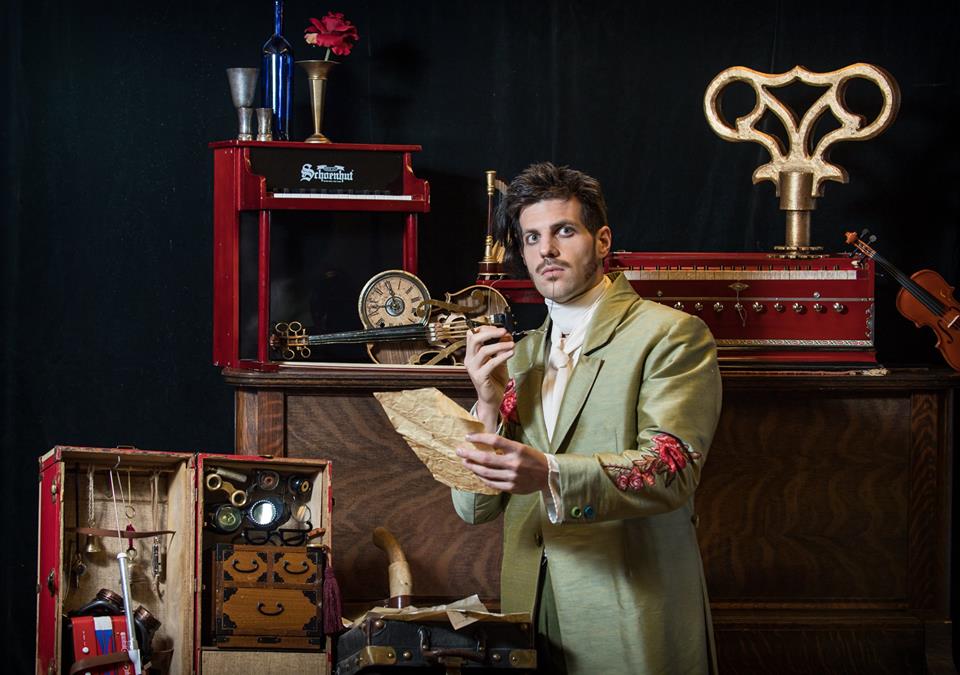
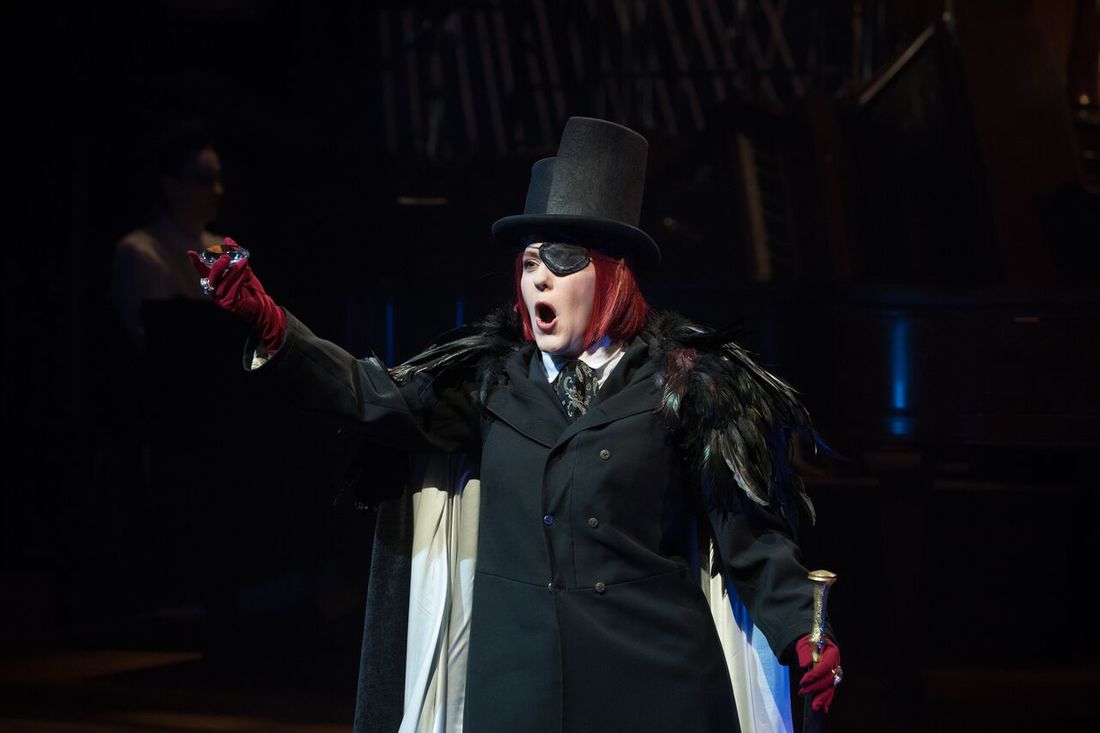
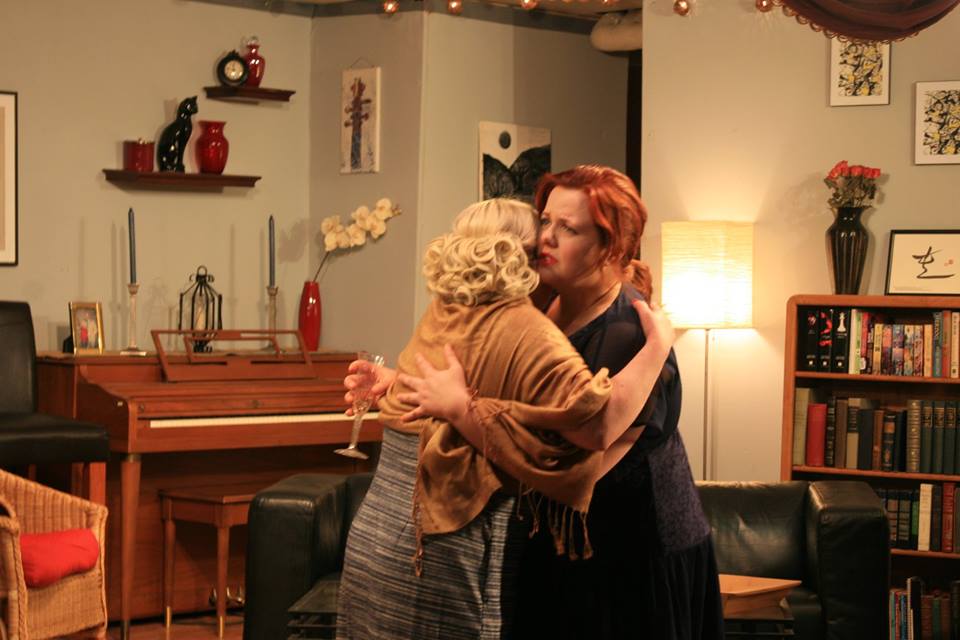
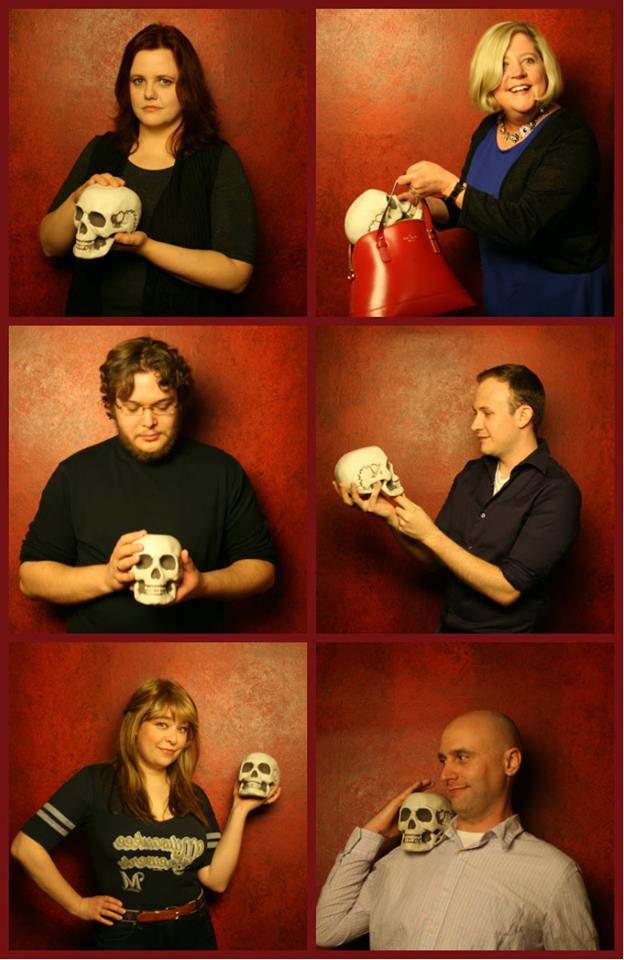
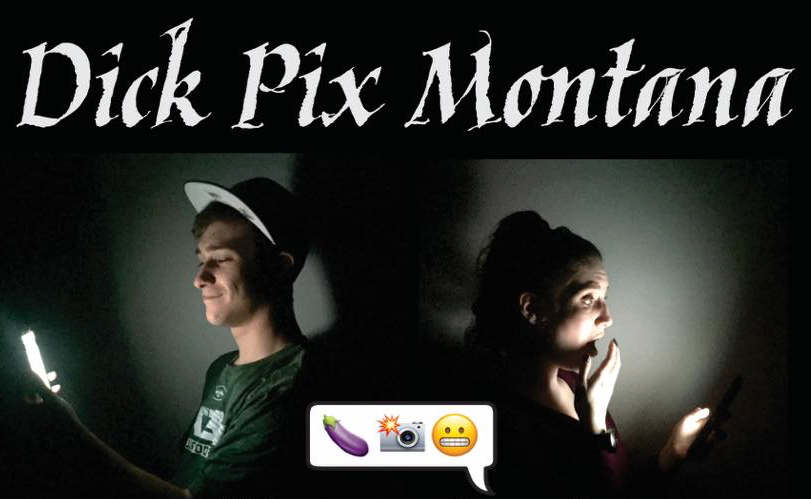
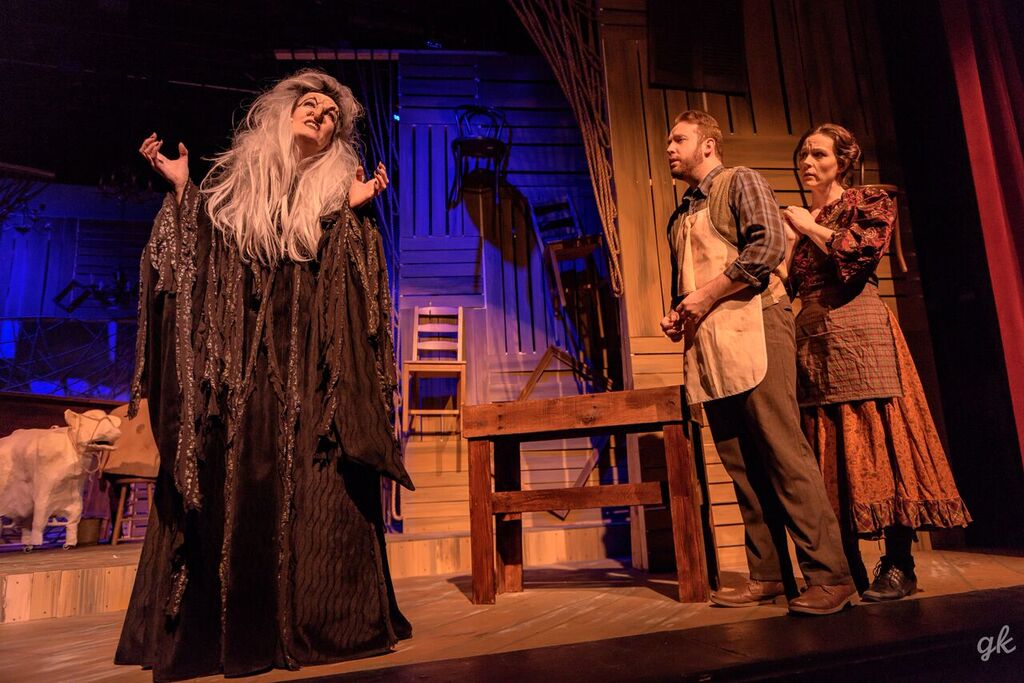
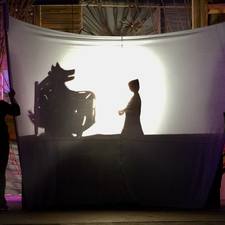
 RSS Feed
RSS Feed
